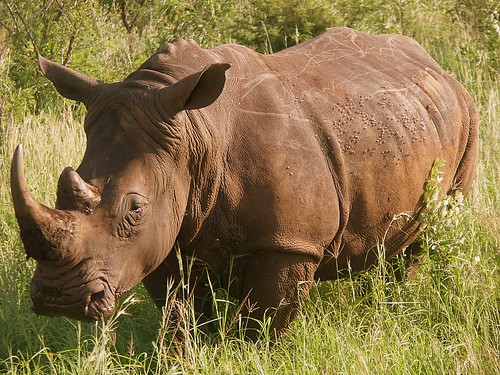Rhinos to be relocated from South Africa to Australia | Tunde Folawiyo
In 2013, approximately 1,004 rhinos were killed in South Africa by poachers – twice the number slaughtered during the previous year. Tunde Folawiyo, and others who are concerned with wildlife conservation, may be aware that this endangered species is now on the verge of extinction, as conservation groups simply cannot keep up with the highly organised poachers who hunt these animals. They have been known to use helicopters and high tech tracking equipment to help them hunt their prey. It is believed that these groups are actually operating out of Mozambique, crossing the border to obtain the rhino horn, and then smuggling it back to their base.

Rhino horns are sold on the black market for about $20,000 per kilo; they are most commonly used in traditional Asian medicinal remedies, for the treatment of ailments like fevers, strokes and nosebleeds. Whilst there is no scientific evidence to support the theory that rhino horn has curative properties, it remains an exceptionally popular – and therefore lucrative – medicine in Asian countries.
Being a conservation enthusiast, Tunde Folawiyo has probably heard that 146 rhinos have already been killed this year in South Africa; this figure was released by the Department of Environmental Affairs recently. Most of the poaching has occurred in Kruger National Park, although there have also been killings in Mpumalanga, KwaZulu-Natal and Limpopo.
Conservationists are now considering relocating the remaining rhinos to a zoo in Australia, in a bid to prevent the entire species from dying out. Allan Davies and Ray Dearlove, the men who co-founded the Australian Rhino Project, are currently conducting talks with Taronga Zoo, in the hopes that they might be able to house some of South Africa’s rhinos. Australia was chosen due to the fact that the species would not find it difficult to adapt to its environment, which is similar, in many ways, to their homeland. Taronga Zoo, based in Sydney, already serves as a home to a number of rhinos and as such, is well-equipped to take care of a few more of these creatures.
Whilst the relocation of some rhinos will help to preserve the species, it will not resolve the issue entirely. Richard Thomas, who works for TRAFFIC (a network which monitors the trading of wildlife) contends that the South African national parks need to establish stronger enforcement action, including the use of detection dogs and more rangers. He also believes that a convention on the trading of endangered animals would help to reduce the demand for rhino horn in Asian countries.
 Tunde Folawiyo
Tunde Folawiyo
Leave a Reply